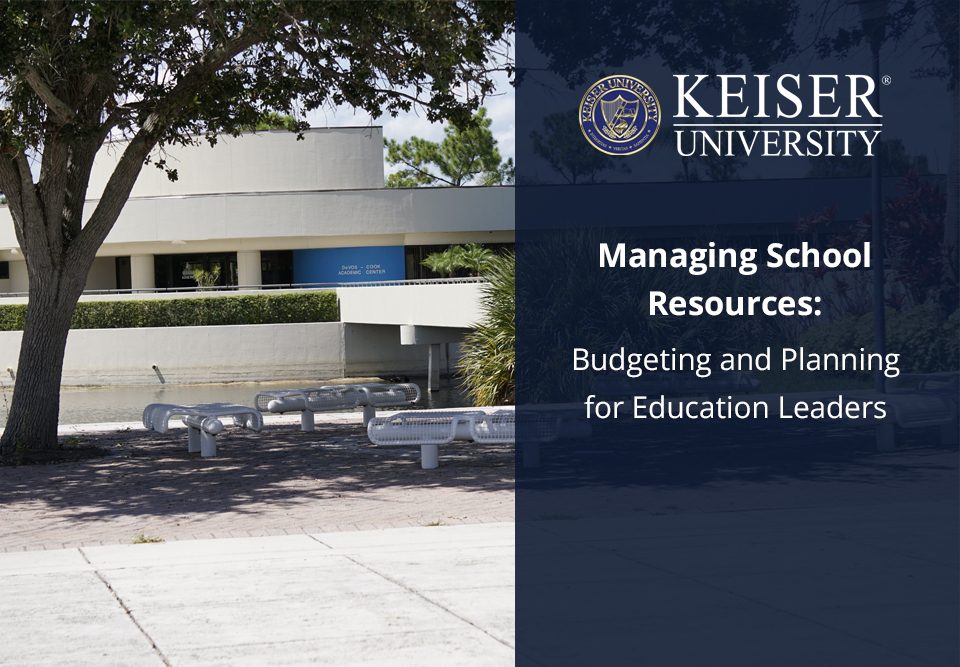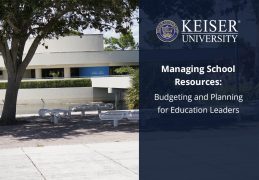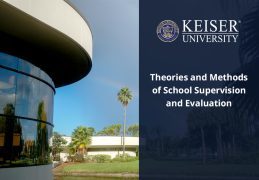These days, schools across the country are having to do more with less. This is especially true when you consider sweeping budget cuts, overcrowding and other common challenges faced across the nation’s school system. As a result, educational leaders are finding ways to get creative with resource management as a means of improving student outcomes and optimizing the learning experience for all.
If you’re interested in getting into educational leadership, understanding the principles of resource management in schools is essential. So, what exactly is school resource management and how can educational leaders more effectively budget and allocate resources for better learning?
School Resource Management and What Is It?
Faculty, staff, and leaders alike should all understand what school resource management entails, as well as its importance in the student learning experience.
Defining School Resources
In general, school resources can be classified into one of three categories as follows:
- Financial resources - This refers to a school’s finances, including staff payroll and student fees.
- Human resources - This refers to faculty and staff, including teachers, resource officers and other workers.
- Material resources - This refers to specific school equipment and supplies, such as computers, equipment, classroom furniture and the like.
Importance of Resource Allocation in Teaching and Learning
Being able to properly allocate resources within an individual school building, or entire district, is no easy task and requires an in-depth understanding of resource management. From a standpoint of material resource management, educational leaders need to know how to ensure enough money is set aside for things like preventative/routine maintenance and emergency infrastructure repairs.
From a human resource management perspective, these same leaders need to handle everything from recruiting and retaining staff to conducting performance reviews and employee relations.
Principles of Effective Budgeting in Education
With all this in mind, what exactly does effective budgeting in education look like? While the specifics may be unique to each school, there are some basic principles that should apply in nearly every resource management scenario.
Budgeting Process in Educational Institutions
The budgeting process for a school will most notably depend on whether the school is public, private, charter or some other type of educational facility. For instance, public schools receive most of their funding from state and federal programs, so budgeting decisions are largely dependent on those funding amounts.
Regardless of where the funding comes from, most schools allocate their spending based on perceived needs. Usually, these needs are carefully calculated based on previous years’ spending and anticipated changes for the coming school year.
Budgeting Principles: Transparency, Accountability, Equity and Sustainability
Educational leaders are also under a lot of pressure to follow certain principles in their budgeting, such as:
- Transparency - Staff, students, parents and others affiliated with the school can see how money is being spent and allocated.
- Accountability - This includes setting clear parameters and boundaries regarding who is responsible for different aspects of budgeting and adhering to a budget.
- Equity - This means that a budget has been created based on the best interests and needs for all involved.
- Sustainability - This concept refers to the allocation of resources with environmental, economic and social needs in mind.
Data-Informed Decision-Making for Resource Allocation
These days, educational leaders also have access to more data than ever before. While this data can be used to better inform budgeting and resource allocation, this is only the case for educational leaders who truly understand how to analyze and interpret data properly.
Data Analysis and Evidence-Based Decision-Making
Specifically, educational leaders need to be able to practice evidence-based decision-making in their everyday resource management and budget allocation. This means taking the time to leverage data and gain valuable insights from data that properly inform how resources should be used or allocated in the best interest of the school.
Strategies for Collecting, Analyzing and Interpreting Data
There are many strategies that can be put into place when it comes to collecting, analyzing and interpreting data for resource allocation purposes. This includes careful analysis of resource pools, scenario planning and examining utilization rates for current resources.
Strategic Planning for Resource Management
Educational leaders are also called upon to handle strategic planning for resource management. This involves careful evaluation and allocation of a school’s resources to work toward a larger common goal or mission.
Importance of Strategic Planning in Resource Allocation
Strategic planning is particularly useful in resource allocation for schools, as it minimizes waste and ensures that staff and teachers have the necessary resources, leading to greater job satisfaction. Meanwhile, proper strategic planning in resource allocation can also address known issues with resource shortages with a focus on ‘big picture’ goals and outcomes.
Elements of Effective Strategic Planning
Strategic planning for resource allocation may look different in different schools, but typically begins with an assessment of current resource management practices and setting goals for a new strategic plan. From there, educational leaders can work with teachers, faculty and other staff to develop and implement a plan with measurable performance indicators and progress monitoring.
Strategies for Developing Comprehensive Strategic Plans
A comprehensive strategic plan for resource allocation should consider all stakeholder needs while looking closely at financial, material and human resources within the school. From there, consulting with as many invested parties as possible can provide valuable feedback that should be incorporated into the strategic plan.
Engaging Stakeholders in the Budgeting Process
As much as educational leadership may want to take the reins and run with their own budgeting plans, the reality is that schools are best served when more people are involved in the process.
Importance of Involving Others in the Budgeting Process
By getting other stakeholders involved in the budgeting process, including teachers and faculty, it’s possible for leadership to get a better feel for areas where resources may be lacking or special attention may be needed. Likewise, involving others in the process can boost morale and help staff members feel like valued members of the school.
Strategies for Collaboration, Transparency and Communication
There are many tips and best practices educational leaders can follow when it comes to improving collaboration, transparency and communication through the budgeting process. For starters, everybody should be encouraged to share their own personal experiences and opinions. Moving forward, leadership should focus on negotiating resources and finding areas where expenses can be reasonably reduced or eliminated.
Leveraging Technology for Resource Management
Technological advancements have made resource planning and resource management easier for educational leaders. However, only when these leaders know how to leverage these technologies to their advantage.
Role of Technology in Budgeting, Reporting and Resource Tracking
Software and other technologies can now automate data collection, making it easier and less time-consuming for educational leaders to track spending. This allows them to see exactly where money is being spent and how it may need to be allocated based on future fluctuations and trends. This can ultimately help improve data-driven decision-making.
Resource Management Technology Best Practices
When working with resource management technologies, such as data collection and reporting software, educational leaders will best serve their schools when they take the time to get to know these technologies inside and out. This includes knowing how to utilize all the platform’s features and even train others on the software when necessary.
Addressing Data Privacy and Security Concerns
Schools often collect sensitive data, both from students and faculty alike. With this in mind, educational leaders need to prioritize data privacy and security when collecting and handling any data to be used for resource allocation or budgeting purposes.
Building Capacity for Resource Management
Resource management isn’t a skill that comes naturally to most people. If you aspire to become an educational leader, then you’ll need to be deliberate about building upon these skills and following best practices to improve outcomes at your school.
Developing the Knowledge and Skills of Education Leaders
The best way to develop the knowledge and skills of the best educational leaders is to immerse yourself in an advanced degree program that focuses specifically on educational leadership. Whether it be a master’s degree or even a doctoral degree in the field, this higher level of formal education can provide the foundational skills that you need to succeed.
Professional Development Opportunities
Educational leaders should also take full advantage of professional development opportunities as they arise. This includes opportunities through the districts in which they work, as well as outside opportunities such as the ability to attend a leadership conference.
Culture of Continuous Improvement and Innovation
Educational leaders, and those aspiring to be leaders, should focus on continuous improvement and development. The best leaders are always learning and never become complacent.
Ready to Elevate Your Education?
As you can see, there’s a lot that goes into making sure that schools have access to the resources they need to optimize student success. Even though many schools are being expected to do more with less, capable educational leaders are using technology, smart budgeting and resource management principles to exceed expectations.
Ready to take the next step in career and become a true educational leader? Keiser University is proud to offer a number of graduate-level programs, including our Education Specialist in Education Leadership (EdS) program and our Master of Science in Education Leadership (MSED-L) program. At the doctorate level, we also offer a Doctor of Philosophy in Educational Leadership PhD program.
To find out more about any of our educational leadership programs, connect with a graduate admissions counselor today. You can also start your application from enrollment at your convenience online.






 My instructors believed in me. They were more than instructors, they tried to get to know you as a person and tried to understand your goals so they could push you towards them. Student services helped me find a job before I even graduated. Everyone was dedicated to my overall success.
My instructors believed in me. They were more than instructors, they tried to get to know you as a person and tried to understand your goals so they could push you towards them. Student services helped me find a job before I even graduated. Everyone was dedicated to my overall success.
